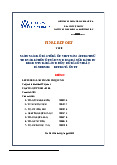


Preview text:
Questions and Answers
Section 1 & 2 Question:
Why is change leadership a key aspect to a successful accession to the Madrid Protocol? Answer:
For the accession process change leadership skills are key, as they provide the ability to develop
an effective strategy for implementing and managing a potential member’s accession and the
ability to influence and advocate for these changes with different stakeholders. Question:
Changes to domestic legislation involve a high level of complexity. This complexity is not only
from the drafting and approval process for the new legislation but also its implementation.
When implementing changes to domestic legislation, what are some of the considerations a
potential member will need to think about? Answer:
Some of the considerations a potential member will need to think about when implementing
changes to domestic legislation are:
Communicating before and after the changes with internal and external stakeholders.
Training staff on the new legislation.
Changing internal IP Office processes to meet the requirements of the new legislation. Question:
Is the following statement true or false?
A potential new member will need to conduct an extensive review of their existing processes
and procedures, to be able to determine the extent to which they will have to modify their
practices to operate within the Madrid System. Answer: True Section 3 Question:
It is important that there is a clear understanding of how WIPO and the Office will
communicate, in particular, how WIPO will transmit notifications to the Office, and how the
Office will send international applications and decision on the scope of protection to WIPO. Why is this important? Answer:
Without a clear understanding of how WIPO and the Office will communicate, the domestic IT
system and the Madrid System may not be effectively integrated. This may lead to slow or missing communications.
This would threaten the ability of the Office to meet its obligations in the Madrid System. Question:
Is the following true or false?
By reviewing all the relevant tasks that an Office as a member of the Madrid System would be
obliged to perform, the Office can reach an understanding on how national or regional
processes will fit with these Madrid processes.
This review process will assist the Office in their determinations on how the national or regional
procedures and operational transactions can be integrated with the procedures of the Madrid System. Answer: True Question:
No matter how positively the decision to accede to the Madrid System is received, there will
always be stakeholders that will be concerned by this decision.
What are some of the strategies an Office can implement pre- and post-accession to make their
stakeholders more comfortable in using the Madrid System? Answer:
An Office should consider implementing stakeholder consultation and communication strategies
relating to how the Madrid System will affect different stakeholder groups. Pre-accession:
Potential members may provide seminars and training programs for different
stakeholders. Attorneys, SMEs, and other potential users of the Madrid System will
require these to understand the system and to promote its acceptance. Post-accession:
Further seminars and post-accession trainings can be useful in maintaining a level of
acceptance within the local industries and IP community.
The Office may also provide information (in local language) on how trademark owners
may benefit from using the Madrid System.




